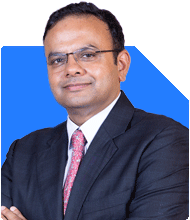Ramalingam Kalirajan |10876 Answers |Ask -Follow
Mutual Funds, Financial Planning Expert - Answered on May 06, 2024
He has an MBA in finance from the University of Madras and is a certified financial planner.
He is the director and chief financial planner at Holistic Investment, a Chennai-based firm that offers financial planning and wealth management advice.... more

Hi sir, I am fifty years old. I was already invested one month ago 12,50,000/- in SBI equity regular growth mutual fund. Now, I am planning to start SIP and monthly 5,000/-. Kindly, advice me for the SIP. Thanks.
• Given your existing investment of 12,50,000/- in SBI Equity Regular Growth Mutual Fund, it's clear you're already on the path to building wealth.
• Adding a monthly SIP of 5,000/- will further enhance your investment strategy and help you achieve your financial goals.
• When selecting a SIP, consider factors like your investment horizon, risk tolerance, and financial objectives.
• As you're fifty years old, it's essential to strike a balance between growth potential and stability in your investment choices.
• Equity mutual funds offer growth potential but also come with higher volatility. Since you're already invested in SBI Equity Regular Growth Mutual Fund, you may want to diversify your portfolio with a different category of mutual fund.
• Debt mutual funds or balanced funds could be suitable options to consider, offering a more conservative approach while still providing potential for growth.
• Additionally, ensure you choose a SIP with a reputable fund house and a track record of consistent performance.
• Look for funds that align with your investment goals and have a proven track record of delivering returns over the long term.
• As a Certified Financial Planner, I'm here to guide you in selecting the right SIP to complement your existing investment and financial objectives.
• We'll evaluate various mutual fund options, assess their suitability for your portfolio, and ensure they align with your risk profile and investment horizon.
• Remember, investing is a journey, and it's essential to stay disciplined and patient.
• By making informed decisions and staying focused on your long-term goals, you can achieve financial success.
• If you have any further questions or need assistance in selecting a SIP, feel free to reach out.
• Your commitment to investing is commendable, and I'm here to support you every step of the way.
You may like to see similar questions and answers below
Ramalingam Kalirajan |10876 Answers |Ask -Follow
Mutual Funds, Financial Planning Expert - Answered on Apr 30, 2024
Abhishek Dev | Answer |Ask -Follow
Financial Planner - Answered on Sep 13, 2023
Sanjeev Govila | Answer |Ask -Follow
Financial Planner - Answered on Feb 06, 2024
Ramalingam Kalirajan |10876 Answers |Ask -Follow
Mutual Funds, Financial Planning Expert - Answered on Nov 19, 2024
Radheshyam Zanwar |6740 Answers |Ask -Follow
MHT-CET, IIT-JEE, NEET-UG Expert - Answered on Dec 09, 2025
Naveenn Kummar |234 Answers |Ask -Follow
Financial Planner, MF, Insurance Expert - Answered on Dec 09, 2025
Ramalingam Kalirajan |10876 Answers |Ask -Follow
Mutual Funds, Financial Planning Expert - Answered on Dec 09, 2025
Ramalingam Kalirajan |10876 Answers |Ask -Follow
Mutual Funds, Financial Planning Expert - Answered on Dec 09, 2025
Radheshyam Zanwar |6740 Answers |Ask -Follow
MHT-CET, IIT-JEE, NEET-UG Expert - Answered on Dec 09, 2025
Radheshyam Zanwar |6740 Answers |Ask -Follow
MHT-CET, IIT-JEE, NEET-UG Expert - Answered on Dec 09, 2025
Nayagam P P |10853 Answers |Ask -Follow
Career Counsellor - Answered on Dec 09, 2025
Mayank Chandel |2569 Answers |Ask -Follow
IIT-JEE, NEET-UG, SAT, CLAT, CA, CS Exam Expert - Answered on Dec 08, 2025
Mayank Chandel |2569 Answers |Ask -Follow
IIT-JEE, NEET-UG, SAT, CLAT, CA, CS Exam Expert - Answered on Dec 08, 2025

Mayank Chandel |2569 Answers |Ask -Follow
IIT-JEE, NEET-UG, SAT, CLAT, CA, CS Exam Expert - Answered on Dec 08, 2025
























